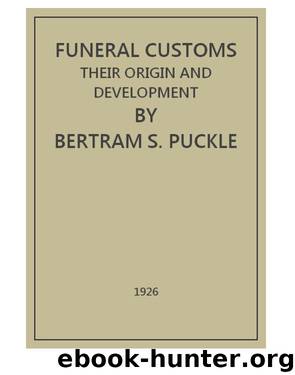Funeral Customs by Puckle Bertram S

Author:Puckle, Bertram S [Puckle, Bertram S]
Language: eng
Format: epub
Publisher: Global Grey
Published: 2014-05-14T23:00:00+00:00
Funeral Customs By Bertram S. Puckle
CHAPTER IX.TREES, FLOWERS, BODY-SNATCHING
INSEPARABLE from the picture which the mind presents at the thought of an old grave, is the yew tree. Often of great size and antiquity, it stands as a land-mark, overhanging with extended arms the tombstone it shelters. Here we shall probably find the weeping willow dear to the heart of the sentimental poet, perhaps also box and cypress trees.
The question arises, are they planted in these places for any particular reason? which seems to be answered by the fact that even in the newest cemeteries the custom is continued.
To seek the origin, we must go back to very early times, and consider ancient rites, which have, like so many of our modern funerary practices, long ceased to hold any special significance.
Abraham, it will be remembered, bought a field on the death of Sarah for a burial ground, but he was not satisfied till "the cave that was therein and all the bees that were in the fields and in all the borders round about were made sure."
Trees, we know, were at one time objects of extreme veneration and worship.
To the primitive mind, movement was inseparable from the idea of life, thus the ripple of the stream or the whisper of the wind, or the creaking of the branches lashed by the storm, left the impression of some subtle animation dwelling in natural objects, very powerful for good or evil: and as such necessary to be propitiated, thus, from the earliest times, we find trees worshipped in one form or another.
The early Christian missionaries had struggle enough to shake this deep-rooted notion out of the minds of our tree-worshipping forefathers, and in the end, it would seem that they were not altogether successful, and that their contentions ended up by something of a compromise, for we find holly still taking the honoured place at Christmas-tide that it held in the days when the Druids distributed it amongst the people at the great December festival, and if box and evergreen, banned by the Church, have crept into the sacred edifice, mistletoe is still out of sanctuary.
Even the Greek philosophers gave souls to the trees, and the gods of the ancients had special trees allotted to them; Phyllis weeping for Demophon, is turned by the gods into an almond tree. To the oak supreme honours were paid, and the ash was but little less esteemed.
"Pat as a sum in division goes,
Every planet had a star bespoke.
Who but Venus should govern the rose,
Who but Jupiter owned the oak?"
The oak and the ash are trees particularly English, about which a number of superstitions and customs cling.
The rowan tree or mountain ash was believed to possess special powers against evil spirits, and bundles of its twigs were hung over the farmhouse and cottage doors to avert the dreaded powers of witchcraft.
Canon Mahe of Morbihan, writing of the year 1825, mentions "Our Lady of the Oak" in Anjon and "Our Lady of the Oak" near Orthe in Maine, as the seats of famous pilgrimages.
Download
This site does not store any files on its server. We only index and link to content provided by other sites. Please contact the content providers to delete copyright contents if any and email us, we'll remove relevant links or contents immediately.
| Ancient & Controversial Knowledge | Ghosts & Hauntings |
| Hermetism & Rosicrucianism | Magic Studies |
| Occultism | Parapsychology |
| Supernatural | UFOs |
| Unexplained Mysteries |
Animal Frequency by Melissa Alvarez(3755)
Sigil Witchery by Laura Tempest Zakroff(3652)
Real Magic by Dean Radin PhD(3569)
Fingerprints of the Gods by Graham Hancock(3213)
The Rosicrucians by Christopher McIntosh(3049)
Aleister Crowley: The Biography by Tobias Churton(3020)
Journeys Out of the Body by Robert Monroe(2984)
Alchemy and Alchemists by C. J. S. Thompson(2912)
Mysteries by Colin Wilson(2885)
Hitler's Monsters by Eric Kurlander(2732)
John Dee and the Empire of Angels by Jason Louv(2710)
Wicca: a guide for the solitary practitioner by Scott Cunningham(2704)
Infinite Energy Technologies by Finley Eversole(2492)
The Hatha Yoga Pradipika (Translated) by Svatmarama(2482)
Dark Star Rising by Gary Lachman(2419)
The Book of Lies by Aleister Crowley(2384)
Aliens by Jim Al-Khalili(2382)
To Light a Sacred Flame by Silver RavenWolf(2353)
Hitler's Flying Saucers: A Guide to German Flying Discs of the Second World War by Stevens Henry(2293)
